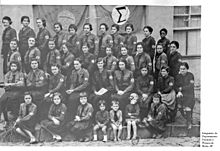Brazilian Integralist Action
In its outward forms, Integralism was similar to European fascism: a green-shirted paramilitary organization with uniformed ranks, highly regimented street demonstrations, and rhetoric against Marxism and liberalism.
However, it differed markedly from it in specific ideology: a prolific writer before turning political leader, Salgado interpreted human history at large as an opposition between "materialism"—understood by him as the normal operation of natural laws guided by blind necessity—and "spiritualism": the belief in God, in the immortality of the soul, and in the conditioning of individual existence to superior, eternal goals.
In the face of communist advances, and at the same time building on his intensive crackdown against the Brazilian left, Vargas turned to the integralist movement as a single mobilized base of right-wing support.
Integralism, claiming a rapidly growing membership throughout Brazil by 1935, especially among the German-Brazilians and Italian-Brazilians (communities which together amounted to approximately one million people), began filling this ideological void.
In 1938, the Integralists made a last attempt at achieving power, by attacking the Guanabara Palace during the night, but police and army troops arrived at the last minute, and the ensuing gunfight ended with around twenty casualties.
[8] The AIB disintegrated after that failure in 1938, and in 1945 Salgado founded the Party of Popular Representation (PRP), which maintained the ideology of Integralism, but without the uniforms, salutes, signals, and signs.
The Brazilian populist leader (and Goulart's brother-in-law) Leonel Brizola, in an early stage of his political career, won the gubernatorial elections in the State of Rio Grande do Sul by means of an electoral alliance with the PRP.
Augusto Rademaker and Márcio Melo, former Integralistas, served as two of the three member junta that briefly ruled Brazil in 1969, during the transition from the second military government (that of Artur da Costa e Silva) to the third (that of Emílio Médici).



